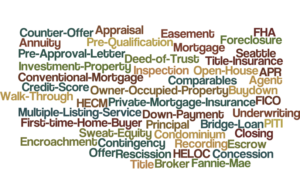Welcome to your first step towards buying your first home. It's FREE!
Earnest money is one of the best ways to show a seller you’re serious about the offer you’re making on their home. By placing a portion of  your down payment on the table to demonstrate your commitment to follow-through on the contract, you’re saying “I love this home and I’m ready to go.” But there’s a real risk involved: If you make a mistake, you might just be out a chunk of cash.
your down payment on the table to demonstrate your commitment to follow-through on the contract, you’re saying “I love this home and I’m ready to go.” But there’s a real risk involved: If you make a mistake, you might just be out a chunk of cash.
Here are some ways to avoid burning your home-buying bankroll in lost earnest money:
- Make sure it’s the home you really want. Seem obvious? Sure. But it’s easy to get swept up in the moment. Recognize that you’re about to enter into a legally binding contract and that losing the money you’re risking will hurt if you change your mind. While you may not be able to drag your feet on the decision, check your gut to see if there are any reservations lurking there before you go all in.
- Don’t sacrifice contract contingencies. Don’t let your desire for a home cause you to blindly remove contingencies which are built into contracts to protect buyers. Common ones include loan contingencies, title search issues, and appraisal. Waive these at your own peril.
- Carefully consider committing to a home “as is.” If you’re putting earnest money on an offer for a foreclosed home, don’t be too eager to accept any problem the home may have. Take the time to understand the home’s issues before you write the offer.
- Read the contract timelines. Look at closing dates and other dates related to the process leading up to closing. Violating the timeline could cost you your earnest money as well.
- Ensure you have recourse to get some or all of your earnest money back. If the sale doesn’t gel, you and the property owner will need to sign a document voiding the agreement. Don’t sign this until you understand how it will impact your earnest money refund. The seller’s title can be negatively impacted if you don’t sign off, so keep your leverage handy until you’re sure you’ve been fairly treated.
Protect yourself and your down payment by playing smart with your earnest money. I will discuss the details of the contract with you, identifying where your earnest money is protected and where it may be at risk.
Ready to buy? Give me a call and let me help you find the right home and protect your interests along the way.
As you explore the possibility of buying your home, you may come across terms that are unclear, unfamiliar, or new to you. I might even slip into the “everyday jargon” of real estate forgetting that some of the words I am using aren’t all that everyday for most people. 
In keeping with my efforts to make everything as clear as possible, I would like to share this handy reference guide published by the Federal Trade Commission. The 18-page PDF guide is free to download. “The Real Estate Glossary: How to Talk the Talk,” contains a “glossary to help you better understand the terms commonly used in the real estate and mortgage marketplace.”
You can download the Real Estate Glossary from here:
Naturally, we are happy help you and can discuss any of your questions and comments. If want further clarification we can help!
PS new class schedules coming soon…
The Northwest received almost $330 million in Federal resources to revitalize our
communities, put people back to work and speed America back on the road to
recovery from what has come to be called “The Great Recession.”
In passing the Recovery Act, the Congress and the President specified a
wide range of activities to which state, county and city governments hard hit
by the downturn could apply Recovery Act funds – your tax dollars – from
meeting critical capital needs to expanding the supply of affordable housing,
from preventing homelessness to helping small businesses gain access to much
needed capital. Under the Act, those local governments were given full
authority to decide for themselves the specific what’s, where’s and how’s of
the projects that would best benefit their communities.
Here are some of the programs that will be funded
by the Federal money in the King County area:
- Promoting Energy Efficiency and Creating Green Jobs
- $40,250,758 to Washington State’s 29 housing authorities.
- $14,863,303 to 30 tribal organizations in Washington.
- Lead Hazard Reduction/Healthy Homes – $6,725,000 to to King County, City of Spokane
and State of Washington. - Supporting Shovel-Ready Projects and Assisted Housing Improvements
- Promoting Stable Communities and Helping Families Hardest Hit by the Economic Crisis
- Emergency Shelter Grant Program/Homelessness Prevention – $24,948, 653 to 10 grantees in Washington.
